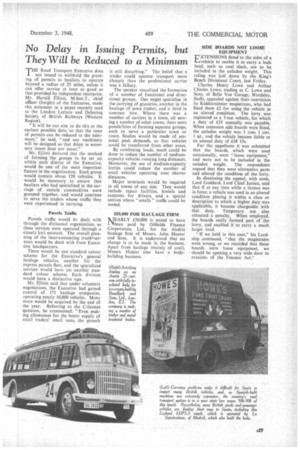No Delay in Issuing Permits, but They Will be Reduced
Page 29

If you've noticed an error in this article please click here to report it so we can fix it.
to a Minimum THE Road Transport Executive does not intend to withhold the granting of permits to hauliers to operate beyond a radius of 25 miles, unless it can offer service at least as good as that provided by independent enterprise. Mr. Harold Elliott, Minst.T., chief officer (freight) of the Executive, made this statement in a paper recently read to the London Lecture and Debating Society of British Railways (Western Region).
it will be our aim to do this at the earliest possible date, so that the issue of permits can be reduced to the minimum," he said, and our machinery will be designed so that delay in necessary issues does not occur."
Mr. Elliott declared that the method of forming the groups to be set up within each district of the Executive, would be one of the most important factors in the organization. Each group would contain about 120 vehicles. It would be necessary to ensure that hauliers who had specialized in the carriage of . certain commodities were grouped together, and would continue to serve the traders whose traffic they were experienced in carrying.
Parcels Traffic Parcels traffic would be dealt with through the divisional organization, as these services were operated through a closely knit network. The overall planning of the inter-connecting tnmkeservices would be dealt with from Executive headquarters.
There would be one standard colour scheme for the Executive's general haulage vehicles, another for the express parcels fleet, and the specialized services would have yet another standard colour scheme. Each division would have a distinctive sign.
Mr. Elliott said that under voluntary negotiations, the Executive had gained control of 171 haulage companies, operating nearly 10,000 vehicles. Many more would be acquired by the end of the year. Referring to the C-licence question, he commented: "Even making allowances for the better supply of retail traders' small vans, the growth is still disturbing." The belief that a trader could operate transport more cheaply than the professional carrier was a fallacy.
The speaker visualized the formation of a number of functional and directional groups. One might specialize in the carrying of groceries, another in the haulage of sawn timber, and a third in contract hire. Where there was a number of carriers in a town, all serving a number of-other towns, there were possibilities of forming separate groups, each to serve a particular town or route. Studies would be made of seasonal peak demands., so that vehicles could be transferred from other areas.
By combining loads, much could be done to reduce the number of mediumcapacity vehicles running long distances. Moreover, the use of medium-capacity lorries could reduce the number of small vehicles operating over shorter distances.
Major terminals would be required in all towns of any size. They would include repair facilities, hostels and canteens for drivers, and a special section where "smalls" traffic could be sorted.
150,000 FOR HAULAGE FIRM
NEARLY £50,000 is stated to have been paid by Oilfields Finance Corporation, Ltd., for the Airdrie haulage firm of Messrs. John Hunter and Sons. It is understood that no change is to be made in the business. Apart from haulage (mainly of coal), Messrs. Hunter also have a bodybuilding business.
SIDE BOARDS NOT LOOSE EQUIPMENT
EXTENSTONS fitted to the sides of a vehicle to enable it to carry a bulk load, such as coal slack, are to be included in the unladen weight. This ruling was laid down by the King's Bench Divisional Court, last Friday.
Charles Henry Lowe and Arthur Charles Lowe, trading as C. Lowe and Sons, of Belle Vue Garage, Wordsley, Staffs, appealed against their conviction by Kidderminster magistrates,, who had fined them £2 for using the vehicle in an altered condition. The lorry was registered as a 3-ton vehicle, for which a duty of £35 annually was payable. When extension side boards were fitted, the unladen weight was 3 tons 1 cwt. I qr., and the vehicle became liable to an annual duty of £38 15s.
For the appellants it was submitted that the boards, which were used occasionally, were "loose equipment," and were not to be included in the unladen weight. The respondents argued that they were alternative parts and altered the condition of the lorry.
In dismissing the appeal, with costs, Lord Goddard, Lord Chief Justice, said that if at any time while a licence was in force, a vehicle was used in an altered condition placing it within a class or description to which a higher duty .was applicable, it became chargeable with that duty. Temporary use also attracted a penalty. When employed, the boards really formed part of the lorry, and enabled it to carry a much larger load.
"If we held in this case," his Lordship continued, "that the magistrates were wrong, or we recorded that these boards were loose equipment, we should be opening a very wide door to evasions of the Finance Act."




























































































